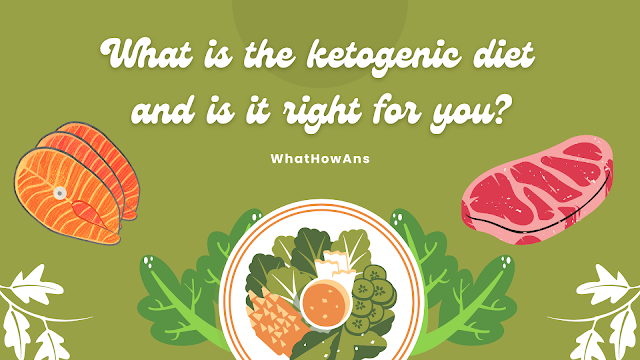The ketogenic diet, or "keto diet" for short, is a low-carb, high-fat diet that has gained popularity in recent years as a weight loss and health improvement strategy. Proponents of the diet claim that it can lead to significant weight loss, improved blood sugar control, and other health benefits. But is the keto diet right for everyone? In this blog post, we'll take a closer look at what the keto diet is, how it works, and whether or not it's a good fit for you.
What is the ketogenic diet?
The ketogenic diet is a high-fat, low-carb diet that has been shown to help some people lose weight and improve their health. The diet is based on the idea that when you significantly reduce your intake of carbohydrates, your body will enter a state of ketosis, in which it begins to burn fat for fuel instead of carbohydrates.
The traditional keto diet involves getting about 70-80% of your daily calories from fat, 20-25% from protein, and 5-10% from carbs. This typically means eating foods like meat, fish, eggs, dairy, nuts, and healthy oils, while avoiding sugary foods, grains, and most fruits.
How does the keto diet work?
When you eat a diet high in carbs, your body converts those carbs into glucose (a type of sugar), which it then uses for energy. However, when you drastically reduce your intake of carbs, your body doesn't have enough glucose to use for energy. As a result, it begins to break down fat into molecules called ketones, which it can use for fuel instead. This state of using ketones for energy is known as ketosis.
By entering ketosis, the idea is that your body will begin to burn stored fat for energy, leading to weight loss. Additionally, because ketones are a more efficient fuel source than glucose, some people on the keto diet report increased energy and mental clarity.
Is the ketogenic diet right for you?
The keto diet can be an effective weight loss and health improvement strategy for some people. However, it's important to note that the diet is not for everyone, and there are potential drawbacks to be aware of.
One potential benefit of the keto diet is that it can lead to rapid weight loss, at least in the short term. Because the diet forces your body to use stored fat for energy, it's common to lose a significant amount of weight in the first few weeks on the diet. However, it's important to note that not all of this weight loss is necessarily fat loss – some of it may be due to the loss of water weight.
Additionally, while the keto diet may improve blood sugar control in people with type 2 diabetes, it may not be suitable for everyone with the condition. The diet can be difficult to stick to long-term, and it may not provide all of the nutrients that people with diabetes need. It's important for people with diabetes to work with a healthcare provider and registered dietitian to determine the best diet for their individual needs.
There are also potential drawbacks to the keto diet in terms of overall health. The diet is high in saturated fats, which can increase the risk of heart disease. It's also low in certain nutrients, such as fiber and certain vitamins and minerals, which can lead to deficiencies if not properly planned for.
Finally, the keto diet can be difficult to stick to long-term, as it requires significant changes to your eating habits and can be challenging to maintain. This can make it difficult to sustain the weight loss and health improvements achieved on the diet.

Comments
Post a Comment